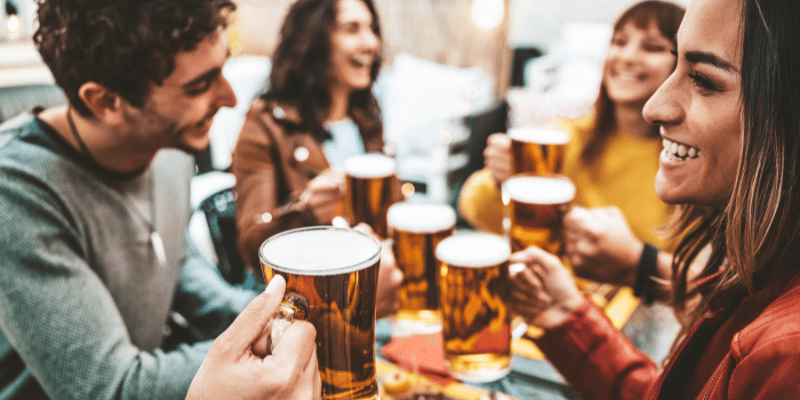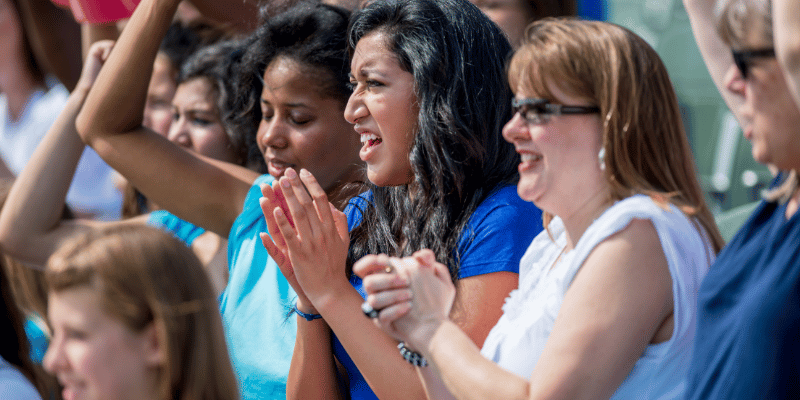Event Pricing: How much should I charge for tickets?
Event Pricing: How Much Should I Charge for Tickets?
Deciding how much to charge for admission to your event is tricky. We see price points all over the board, from under $10 per ticket up to $50, $60, or even $100. How much should you charge for your event?
There’s a sweet spot that makes ticket prices attractive to guests and also allows you to earn a profit on your events. Whether you’re planning a brand new event or reevaluating your existing event’s pricing strategy, this guide will help answer the questions:
- How much should I charge for tickets?
- What do other events charge?
- What are the different pricing models and which one is right for my event?
- When should I offer a discount? Who gets one?
- What upgrades can I offer to increase revenue?
- When should I increase prices?
Let’s jump right in!

What’s New in 2024?
Inflation. Interest rate hikes. Slower consumer spending. There are a lot of economic factors to consider when pricing your event tickets this year.
One place to start calculating your 2024 ticket prices is by looking at what customers spent last year. On Passage, we found that the average in-person transaction was $48.99 while the average online transaction was $79.01. That covers all types of events, and in many cases includes more than one ticket. But it gives you an idea for how much guests are spending.
Those numbers also reveal that guests spend significantly more online than they do in person, which is a trend we’ve seen increasing in recent years. Whatever you charge for admission, make sure you’re selling your tickets online, not just in person, to maximize your sales.
Start by Calculating Your Costs
Many event organizers determine their ticket price using a Cost-Plus model. Take a look at your total budget, and be sure to consider variable costs like staffing, utilities, and marketing & advertising costs into the equation in addition to hard costs like the venue lease. Then, consider how many guests you expect will attend; take the capacity of your venue into account.
This is an overly simplified example, but let’s say your event will cost $10,000 to produce and you expect 1,000 guests to attend. If you charged $10 per ticket you would just break even enough to cover your costs. Of course, that doesn’t take into account revenue you might earn from VIP tickets, or upgrades and add-ons, but we’ll get into those later.
Compare Ticket Prices of Similar Events
This is called competitor-based pricing. Find events in your area with a similar format to yours and see what they’re charging. Your ticket price might be a little higher or a little lower, but if it’s within 5% of your competitor’s event you’re probably good.
Ultimately, to determine the right price for your event you need to ask: What are guests willing to pay?
What we’re really asking is what is my event worth? Guests need to see the value in your ticket price when they choose to spend money on your event instead of another experience or just staying home.
Some events try to under-price their experiences, especially their first year: who wouldn’t see the value in that? But it can backfire if guests think the event isn’t worth their time. There are pros and cons to each approach.

Four Pricing Models for Event Tickets
Finding the right price starts with identifying a pricing model. That is, the type of admission you’ll offer and what that includes. Some events choose to charge one price for an all-you-can-enjoy model. Others let guests pick and choose which experiences they want to pay for. Neither one is right or wrong, it’s about finding the model that fits best for your event.
Using the right pricing model can help improve the perceived value of your event. For example, an event that charges a higher ticket price will earn more money in the short-term, but guests will also have greater expectations because they’re spending more. If the event itself doesn’t meet those elevated expectations, guests might not return for the next one.
Let’s break down four common pricing models and which types of events they work best for.
1. Pay per Attraction/Experience
Charging admission to your event doesn’t have to mean a one-price-fits-all model. You can still offer guests some flexibility by charging separately for each attraction within your event.
For example, let’s say you’re hosting a Renaissance Faire with live shows, games, crafts, and other activities. Some experiences might require a separate ticket, such as dinner in the castle, a jousting show, or a medieval crown making class. Or maybe you have a family entertainment center with an indoor playground, mini golf, and an arcade. Those can all be separately ticketed.
Some events handle this with credit card swipers at each attraction, while others have a central “ticket” booth or two, where guests purchase paper tickets which can then be redeemed for entry into the different attractions. Which option you choose depends on your event’s situation.
Pay-per-Attraction might be right for you if:
- Your event offers multiple attractions or experiences.
- You can easily control the flow of traffic in and out of each attraction.
- Your venue has a midway with games or other diversions.
Bundles can be a great way to earn more revenue and make things simple for guests who want to experience everything your event has to offer. Schedule a demo to see how bundled tickets work with Passage.
2. All-Inclusive
All-inclusive packages are appealing because of the convenience factor. As a guest, you know exactly what you’re paying up front. You don’t feel nickel and dimed over every experience.
For event organizers, all-inclusive has its benefits, too. Calculating and managing your event’s budget is much simpler with this model. If most of your tickets are sold in advance, you’ll be able to see how much revenue you have coming in and plan how to cover your expenses.
An all-inclusive pricing model doesn’t have to mean you only offer guests one ticket option. You can still give them an opportunity to upgrade to a VIP or skip-the-line pass, offer a bundled ticket package that includes some concessions or midway games, or other perks.
All-Inclusive might be right for you if:
- You can easily control the flow of traffic in and out of your venue.
- Your event has one attraction, or multiple experiences which can be bundled together.
- Your audience can see the value in a higher ticket price with all experiences included.
3. Pay-What-You-Can
Letting guests decide what your event is worth is tricky. What if they think your event is worth less than what you think? Will you still be able to cover your costs?
Pay-what-you-can pricing is becoming more popular these days. It can give you incredible insight into how your audience perceives your event and its value. This can be useful for future pricing.
Pay-what-you-can pricing has other benefits, too. It can be a good way to get customers in your venue on slow nights, which gives you the opportunity to introduce your event to guests who may not otherwise have attended in the past. If they enjoy themselves, they may come back on a night with higher ticket prices.
For nonprofit events, pay-what-you-can encourages donors to give a little extra if the proceeds are benefiting a charity they support. You might set a minimum price, but it’s completely up to the guest’s discretion what they pay above that.
Pay-What-You-Can might be right for you if:
- You want to be inclusive and let everyone attend regardless of their economic situation.
- You’re offering it as a one-night special on a designated date (ideally one that you wouldn’t normally sell out, like a weekday).
- You’re hosting a nonprofit event that your guests have a strong desire to support.
- Guests have a strong desire to support the beneficiary organization (the one your proceeds will go to) and are likely to be generous with their donations.
4. Free
You might be wondering why on earth you’d host a free event. How will you make money if guests aren’t paying admission?
Free admission can be very appealing if your event offers a lot of paid extras within the experience. For example, you’re hosting a fall festival or family-friendly fair that includes a pumpkin patch, hayrides, cider and donuts, along with other paid extras. Getting guests through the door for free might be worth it if most of your revenue comes from in-event purchases.
This option can also work nicely when you want to allow guests to come and go as they please throughout the day and night. However, you’ll need to consider your overhead before offering free admission. Will you be able to cover your costs through profits from your on-site sales alone?
Free Admission might be right for you if:
- Your up-front costs are relatively low and you’re comfortable generating all of your revenue the day of the event.
- Your event allows for re-entry throughout the day/weekend/week.
- You have diverse vendors (think: a mix of food, drinks, and merch) who want to set their own pricing, and you’re earning a portion of each sale.
You can still capture guest registrations with free entry! This will help you remarket to them so you can invite them back next year, or sell them tickets to your next paid experience. Schedule a demo to see how Passage can help you do that.

How do I Know if I’m Charging the Right Price?
Consistent crowds are a good sign that your customers see the value in the cost of admission for your events.
If you’re selling out every single event well in advance, that’s a signal that demand is higher than supply. It might be time to consider a price increase. Alternatively, if you don’t want to raise ticket prices, you could keep your general admission price the same and increase the cost of add-ons and upgrades like a skip-the-line pass.

What About Discounts?
Discounts can be a great way to introduce new fans to your events or to fill your venue on slower nights.
There are many different types of discounts your event can offer, such as:
- Group discounts. If someone is bringing a large group of people to your event, it may be worth offering them tickets at a lower price. With Passage you can do this by sending someone a link to a private event, where only they can access special pricing, or by allowing anyone who purchases a minimum number of tickets to enjoy the discount.
- Promo Code Discounts. These are great for tracking the effectiveness of your marketing and advertising promotions. If a guest uses a promo code from a specific campaign, you know where that traffic came from.
- Social Media Discounts. If your fans like your events, maybe their friends will, too! Passage uses social media discounts in a unique way which offers ticket buyers an immediate discount on their purchase when they share your event on Facebook or Twitter.
Need help figuring out how much to charge for tickets to your next event? Unsure which pricing model will work best for you? Schedule a demo with an event expert who will help you figure it all out. We’ll even set up all your ticketing for you!











